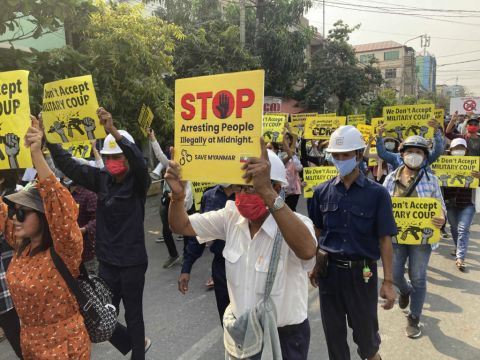Myanmar’s ruling junta has declared martial law in a wide area of the country’s largest city, after security forces killed dozens of protesters over the weekend in an increasingly lethal crackdown on resistance to last month’s military coup.
The United Nations said at least 138 peaceful protesters have been killed in Myanmar since the February 1 military coup, including at least 56 over the weekend.
The developments were the latest setback to hopes of resolving the crisis that started with the military’s seizure of power that ousted the elected government of Aung San Suu Kyi.
A grassroots movement has sprung up across the country to challenge the takeover with almost daily protests which the army has tried to crush with increasingly deadly violence
State broadcaster MRTV said the Yangon townships of North Dagon, South Dagon, Dagon Seikkan and North Okkalapa have been put under martial law. That was in addition to two others — Hlaing Thar Yar and neighbouring Shwepyitha — announced late on Sunday.

More violence was reported around the country on Monday, with at least eight protesters in four cities or towns killed, according to the independent broadcaster and news service Democratic Voice of Burma.
Photos and videos posted on social media showed long convoys of trucks entering Yangon.
At least 38 people were killed on Sunday, the majority in the Hlaing Thar Yar area of Yangon, and 18 were killed on Saturday, UN spokesman Stephane Dujarric said. The total includes women and children, according to the UN human rights office.
UN secretary-general Antonio Guterres “strongly condemns this ongoing violence against peaceful protesters and the continuing violation of the fundamental human rights of the people of Myanmar”, Mr Dujarric said.
The UN chief was renewing his call on the international community, including regional countries, “to come together in solidarity with the people of Myanmar and their democratic aspirations”, the spokesman said.

Earlier on Monday, UN special envoy on Myanmar, Christine Schraner Burgener, condemned the “continuing bloodshed” which has frustrated calls from the Security Council and other parties for restraint and dialogue.
“The ongoing brutality, including against medical personnel and destruction of public infrastructure, severely undermines any prospects for peace and stability,” she said.
Complicating efforts to organise new protests, as well as media coverage of the crisis, mobile phone internet service has been cut, although access is still available through fixed broadband connections.
Mobile data service had been used to stream live video coverage of protests, often showing security forces attacking demonstrators. It previously had been turned off only from 1am to 9am for several weeks, with no official explanation.
The blockage of internet service forced postponement of a court hearing in the capital, Natpyitaw, for Myanmar’s detained leader Ms Suu Kyi, who was supposed to take part by video conference, said her lawyer Khin Maung Zaw.
Ms Suu Kyi and President Win Myint were detained during the coup, and have been charged with several criminal offences that their supporters believe are politically motivated to keep them locked up.
Since the takeover, Myanmar has been under a nationwide state of emergency, with military leaders in charge of all government, but Sunday’s announcement was the first use of martial law since the coup and suggested more direct handling of security by the military instead of police.







